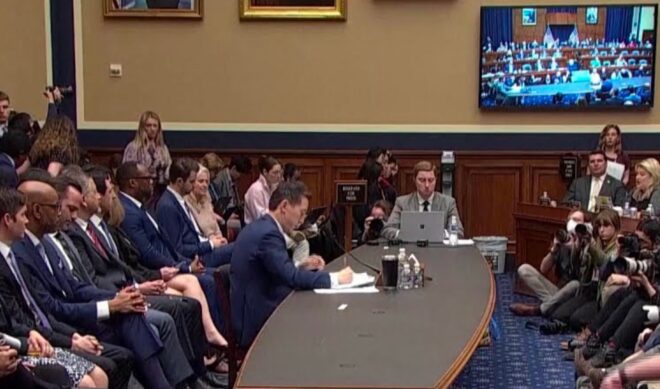Shou Zi Chew‘s visit to Capitol Hill delivered plenty of fireworks. During a five-hour appearance before the House Energy & Commerce Committee, the TikTok CEO repeatedly sparred with Congressional regulators and insisted that his company is capable of protecting the user data of American citizens.
If you missed the hearing, we’re here to catch you up. Here are some of the main themes that came up repeatedly during Chew’s contentious testimony:
Congress isn’t convinced by Project Texas
As TikTok looks to avoid the stateside ban that would be facilitated by the recently-proposed RESTRICT Act, it has urged the U.S. government to adopt the security deal known as Project Texas. In front of Congress, Chew stated that Project Texas would provide vital safeguards for U.S. user data.

Subscribe for daily Tubefilter Top Stories
Unfortunately for Chew, his opponents in the House of Representatives were not convinced by his assurances. Jay Obernolte (R-CA), a former video game developer, identified potential backdoors and loopholes that could allow Chinese officials to access the sensitive data no matter which servers it is held on. “My concern is that I don’t believe it is technically possible to accomplish what TikTok says it will accomplish through Project Texas,” Obernolte said.
Congress grilled its guest — and Chew struggled to hold his ground
Before Chew’s visit to the Capitol, the last TikTok exec to testify before Congress was Chief Operating Officer V Pappas, who spoke to regulators last September as part of a tech summit. Pappas opted for a combative approach, often questioning the validity of the questions asked by Congresspeople.
In comparison, Chew was much more deferential than his COO. He avoided tricky questions but rarely raised his voice, even as his opponents hit him with serious, wide-ranging accusations.
It was the assembled Committee members who brought the thunder. Marc Veasey (D-TX) argued that Pappas’ assurances about TikTok’s data security had been rendered “worthless,” while Dr. Neal Dunn (R-FL) attempted to invalidate Chew’s entire testimony.
“We do not find you credible,” Dunn said. In response, Chew’s composure briefly slipped. “You have given me no time to answer your questions,” he fired back.
Observers on Twitter seemed to agree with Chew’s complaint. Several widely-shared tweets accused Congresspeople of asking leading questions and giving the TikTok CEO no time to respond.
The issues in play are bigger than TikTok
Most members of the House Energy & Commerce Committee made clear that they would prefer to see TikTok receive a U.S. ban. Perhaps, with the help of sympathetic influencers, Chew and co. will be able to escape that fate.
But whatever happens to TikTok, one thing is clear: The security risks posed by social media will not disappear if a single app goes away. Some of the assembled Congresspeople recognized that truth. Yvette Clarke (D-NY) admitted that the problems she discussed are “neither new nor unique to TikTok,” and Chew responded to many questions by describing issues as industry-wide boogeymen, not TikTok-specific faults.
“The overwhelming experience is a very positive one for our community,” Chew said. He called for “clear transparent rules that apply to all tech companies” and reminded regulators that many American corporations deal with their own security flaws.
Congress asked TikTok’s CEO if he’d be willing to divest from Chinese ownership.
His incredibly fair, savage answer?
“American social companies don’t have a good track record with data privacy and user security. I mean, look at Facebook and Cambridge Analytica.” pic.twitter.com/cVP9dph5wL
— Jack Appleby (@jappleby) March 23, 2023
TikTok’s regulatory headache is part of a bigger discussion about internet platforms and the protections they receive. That conversation will never end until the U.S. government considers the best way to reimagine Section 230 of the Communications Decency Act — and that discourse is already underway.









